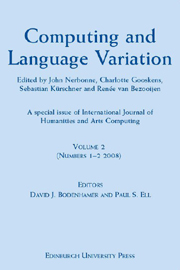Book contents
- Frontmatter
- Contents
- From the Editors
- Notes on Contributors
- 1 Introduction: Language Variation Studies and Computational Humanities
- 2 Panel Discussion on Computing and the Humanities
- 3 Making Sense of Strange Sounds: (Mutual) Intelligibility of Related Language Varieties. A Review
- 4 Phonetic and Lexical Predictors of Intelligibility
- 5 Linguistic Determinants of the Intelligibility of Swedish Words among Danes
- 6 Mutual Intelligibility of Standard and Regional Dutch Language Varieties
- 7 The Dutch-German Border: Relating Linguistic, Geographic and Social Distances
- 8 The Space of Tuscan Dialectal Variation: A Correlation Study
- 9 Recognising Groups among Dialects
- 10 Comparison of Component Models in Analysing the Distribution of Dialectal Features
- 11 Factor Analysis of Vowel Pronunciation in Swedish Dialects
- 12 Representing Tone in Levenshtein Distance
- 13 The Role of Concept Characteristics in Lexical Dialectometry
- 14 What Role does Dialect Knowledge Play in the Perception of Linguistic Distances?
- 15 Quantifying Dialect Similarity by Comparison of the Lexical Distribution of Phonemes
- 16 Corpus-based Dialectometry: Aggregate Morphosyntactic Variability in British English Dialects
13 - The Role of Concept Characteristics in Lexical Dialectometry
Published online by Cambridge University Press: 12 September 2012
- Frontmatter
- Contents
- From the Editors
- Notes on Contributors
- 1 Introduction: Language Variation Studies and Computational Humanities
- 2 Panel Discussion on Computing and the Humanities
- 3 Making Sense of Strange Sounds: (Mutual) Intelligibility of Related Language Varieties. A Review
- 4 Phonetic and Lexical Predictors of Intelligibility
- 5 Linguistic Determinants of the Intelligibility of Swedish Words among Danes
- 6 Mutual Intelligibility of Standard and Regional Dutch Language Varieties
- 7 The Dutch-German Border: Relating Linguistic, Geographic and Social Distances
- 8 The Space of Tuscan Dialectal Variation: A Correlation Study
- 9 Recognising Groups among Dialects
- 10 Comparison of Component Models in Analysing the Distribution of Dialectal Features
- 11 Factor Analysis of Vowel Pronunciation in Swedish Dialects
- 12 Representing Tone in Levenshtein Distance
- 13 The Role of Concept Characteristics in Lexical Dialectometry
- 14 What Role does Dialect Knowledge Play in the Perception of Linguistic Distances?
- 15 Quantifying Dialect Similarity by Comparison of the Lexical Distribution of Phonemes
- 16 Corpus-based Dialectometry: Aggregate Morphosyntactic Variability in British English Dialects
Summary
Abstract In this paper the role of concept characteristics in lexical dialectometric research is examined in three consecutive logical steps. First, a regression analysis of data taken from a large lexical database of Limburgish dialects in Belgium and The Netherlands is conducted to illustrate that concept characteristics such as concept salience, concept vagueness and negative affect contribute to the lexical heterogeneity in the dialect data. Next, it is shown that the relationship between concept characteristics and lexical heterogeneity influences the results of conventional lexical dialectometric measurements. Finally, a dialectometric procedure is proposed which downplays this undesired influence, thus making it possible to obtain a clearer picture of the ‘truly’ regional variation. More specifically, a lexical dialectometric method is proposed in which concept characteristics form the basis of a weighting schema that determines to which extent concept specific dissimilarities can contribute to the aggregate dissimilarities between locations.
BACKGROUND AND RESEARCH QUESTIONS
An important assumption underlying most if not all methods of dialectometry is that the automated analysis of the differences in language use between different locations, as they are recorded by dialectologists in large scale surveys, can reveal patterns which directly reflect regional variation. In this paper, in which we focus on lexical variation, we want to address one factor, viz. concept characteristics, which we will claim complicates this picture.
The argumentation which underlies our claim consists of three consecutive logical steps. As a first step, we analyse data taken from a large lexical database of Limburgish dialects in Belgium and The Netherlands, in which we more particularly zoom in on the names for concepts in the field of ‘the human body’.
Information
- Type
- Chapter
- Information
- Computing and Language VariationInternational Journal of Humanities and Arts Computing Volume 2, pp. 221 - 242Publisher: Edinburgh University PressPrint publication year: 2009
